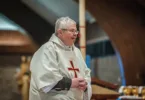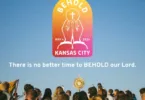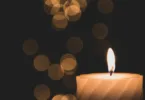Rights of conscience under attack
——————————————————————————————————————
by Joe Bollig
joe.bollig@theleaven.org
KANSAS CITY, Kan. — When you hear a “code blue” called in a hospital, you know that immediate action is required to handle a serious situation.
The U.S. bishops are now calling a “code blue” for conscience, and are asking all Catholics — especially those employed in the health care industry — to respond.
A 30-day period for public comment, established by the Department of Health and Human Services, will end on April 9. The opportunity to voice opposition to revoking the executive order is almost over.
Early at the start of his administration, President Barack Obama announced his intention to revoke an executive order that was issued by President George W. Bush just before the end of his term of office.
This “right of conscience” rule gave federal health officials the power to end federal funding for any governmental entity, hospital, clinic, health plan or other health care organization that did not allow health care workers to refuse to participate in activities that violated their conscience.
The rule bolstered enforcement of three long-standing federal laws that prohibited discrimination against health care workers and professionals who did not want to take part in medical procedures like abortions because of religious, ethical or moral beliefs.
Birth-control and abortion-rights activists criticized the “right of conscience” rule, saying it would impede access to all sorts of health care. Many pro-life advocates argued that, without conscience protection, health care workers and medical professionals could be discriminated against or even fired for following their beliefs.
“This strikes at the very heart of our freedom,” said Archbishop Donald W. Wuerl, of the Archdiocese of Washington, D.C.
“There has always been freedom of conscience so that no one is forced to do a procedure they find morally reprehensible.”
Dr. Robert Reddig, a resident in neurology at the University of Wisconsin at Madison, is one of many who are concerned.
“I think it’s a very real issue,” said Reddig, a 1997 Bishop Miege High School graduate and former member of St. Agnes Parish in Roeland Park. “Going through medical school, I was very much concerned that I would have to be part of something I didn’t believe in, especially when I did my obstetrics and gynecology rotation.”
“I was very worried I would at least watch, or be present for, an abortion,” he added. “It’s also often that patients will ask for a prescription for birth control, just assuming that anyone would write [a prescription] for that, and I won’t do it.”
Reddig believes right of conscience protections are needed for all health care workers and professions, even those whose specialties will not take them near the abortion issue. He, for instance, deals with end-of-life issues such as nutrition and hydration.
“Also, there is some concern among health care workers that there is no rule on the books about not having to perform actions,” said Reddig. “There is always the possibility that we could be brought to legal action for refusing to perform procedures that we have no business performing.”
In a statement issued by the U.S. Conference of Catholic Bishops, Bishop William F. Murphy of the Diocese of Rockville Center in New York said that revoking the executive order “raises a real issue, because the statutes are intended to protect human rights — rights of conscience and rights of freedom of religion.”
It is a fallacy to believe these rights come from government.
“There’s a real problem with that kind of thinking,” said Bishop Murphy. “The government did not give us rights and the government is acting wrongly if it attempts to try to regulate rights in the sense of compromising anyone’s rights. All the government can do is foster and guarantee and defend rights. Otherwise, it’s a false government.”
Bishop Murphy said the bishops cannot oppose this measure alone, but need the help of Catholics all across the nation. To assist them, they’ve set up a special Web page at: www.usccb.org/conscience protection.
By clicking on the “Act Now” button, Web users will be directed to a grass-roots action center at the National Committee for a Human Life Amendment Web site. This site is set up so users can contact HHS easily and quickly.
But act now — again, the 30-day period for public comment ends April 9.






